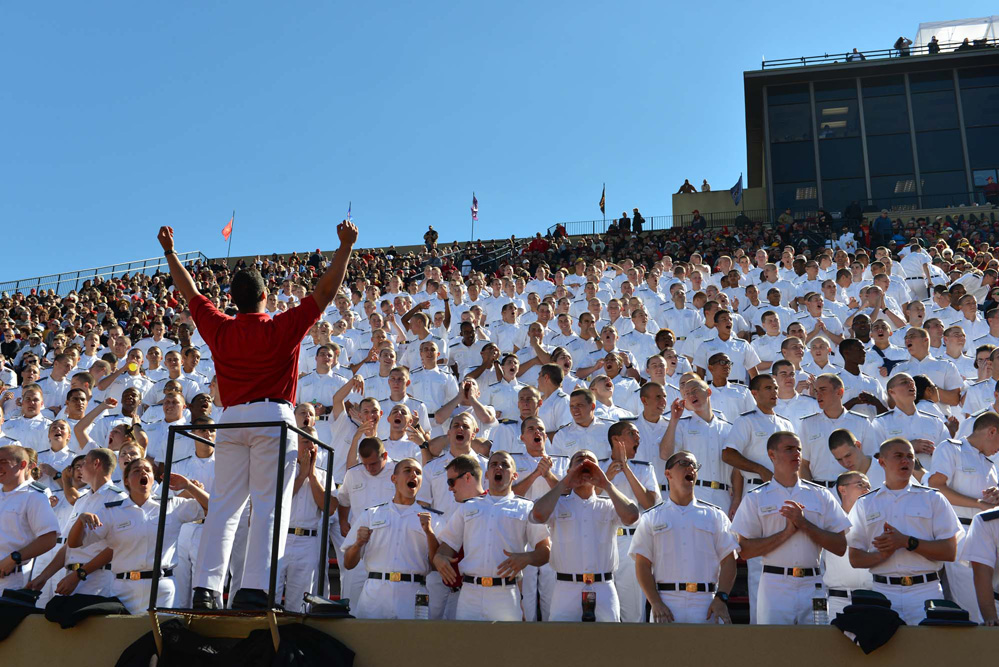Toward a Safer Game Day
 |
|
A large crowd gathers for a home football game last year. – VMI File Photo by Kelly Nye. |
LEXINGTON, Va., Sept. 30, 2016 – While no one really expects major security issues at a VMI football game, these days, one never knows. So just in case, VMI has it covered.
During each home football game, VMI “stands up” its Emergency Operations Center in a highly-organized, well-planned protocol for all big events on post.
“There are a lot of really neat, wonderful, big events that go on at VMI,” said associate deputy superintendent Lt. Col. Dallas Clark ’99. “Behind the scenes, to make sure people are safe and secure, there is a lot of planning and preparation ahead of time.
“The emergency operations center that is set up on game days is really just to manage the event and all of the people,” Clark added. “What it results in is really, really good responses to things that are [important to] overall safety and security.”
People involved with the EOC typically begin their game-day duties at 5 a.m., but preparations for the event begin long before that.
“It’s many, many hours of planning that go into game-day events that have a lot of key members,” said Mike Marshall, chief of the VMI Police, who most often acts as the EOC’s incident commander. “Part of the incident commander’s responsibilities is to do a safety briefing, discuss roles and responsibilities of all staff members in the EOC, and to take part in a table-top exercise.”
Held once a month, these exercises allow members of the Emergency Operation Center to review procedures that have been laid out for them. Often, they will improvise possible scenarios, just to make sure everyone is on the same page, and, according to Clark, the table talks prior to football or basketball games “test the readiness of the committee.
“It’s a little dry run,” Clark said. “We follow a good system; we exercise it for the game day. This is a reminder.”
And it is part of the requirements set forth by the federal government. Several years ago, the Federal Emergency Management Agency issued mandates for all institutions that hold what are deemed “major events.”
“FEMA is very strict on those guidelines you have to follow,” the police chief said. “FEMA says we’re supposed to follow the incident command system, [which] allows us to effectively take action during the event. It gives [us] the human resources necessary to manage the event in an effective and safe manner.”
Marshall, who noted that the NCAA and Southern Conference also have regulations for game-day operations, said the incident command system is made up of several individuals, each with a separate list of responsibilities. The group includes a planning officer, a safety officer, a logistics officer, a liaison officer, and a recorder, and the number of individuals can be increased or decreased quickly, depending upon the situation.
“The system is designed to either grow or shrink relative to the incident and intended to improve coordination of all agencies,” said Marshall.
VMI personnel are not the only ones involved with game-day operations. The EOC also enlists the aid of local, state, and federal law enforcement and rescue agencies, which help with everything from policing to intelligence gathering prior to the event.
“We have the local sheriff’s office, the local police, the fire/rescue, the paramedics, the EMTs, and all of the police officers out policing,” said Clark. “So you have all of these resources to make the stadium and the game safe for all of the spectators.”
Marshall added, “We need the resources from the other agencies to manage the event, not just the human element, but the expertise.”
But perhaps the most important member of the EOC is not really a member at all.
“We rely on community involvement, and we reply to their concerns and observations,” said Marshall. “We need them.”
“We get reports about what people are observing during the event, and it’s very, very helpful,” added Clark. “If you see something, say something.”
Those reports help the EOC keep game days safe for everyone.
“We’ve tried to do a better job in the last 10 years of doing our big major events like the game day, [and] we’ve gotten good,” said Clark. “Because of who we are and the people we are often able to attract here, the whole protocol of dealing with these types of events that require this type of security is not new to us.”
– Chris Floyd
-VMI-
.svg)
.png)